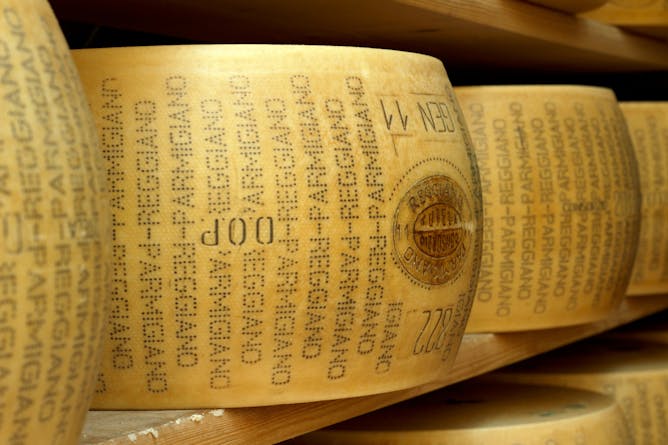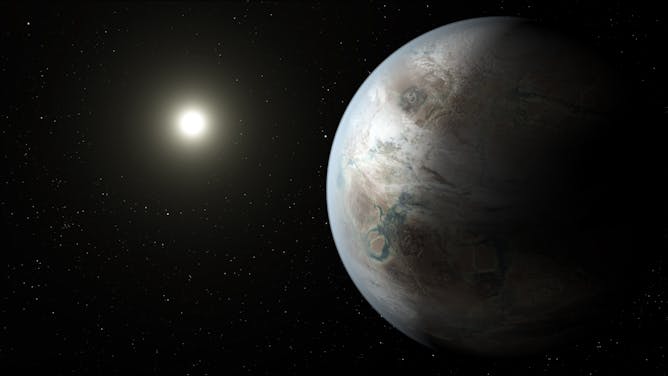|
|
|
Editor's note
|
|
With thousands of exoplanets discovered to date, it is no wonder that so many have been classified as “habitable”. This means that they lie at the right distance from a star for liquid water to exist on their surface. While life may be able to survive on such a body if you dumped it there, we have so far been unable to determine whether it could arise there on its own. But now there’s a new method to identify planets with the right conditions
for life to evolve. Paul Rimmer talks us through his research.
An orange blow-up balloon, demonstrators with faces painted vibrant orange, nicknames ranging from Agent Orange to Mango Mussolini – the colour of Donald Trump’s face has, perhaps more than anything else, characterised the humour and derision directed at the US president. Trump’s fake tan is certainly funny, but Tania Woloshyn, a historian of tanning, argues that there’s far more to his unnatural hue than meets the eye.
As Brexit day creeps closer, one issue that remains unresolved is the way that food names will be protected in Britain and the EU. This might sound like small fry when a no-deal Brexit is still on the cards. But, as Enrico Bonadio and Marc Mimler explain, the issue of protecting geographical names like champagne and feta will likely play a crucial role in trade negotiations with the EU and beyond.
|
Miriam Frankel
Science Editor
|

|
|
Top stories
|

John Gomez / Shutterstock.com
Tania Woloshyn, University of Warwick
Comrade Cheetolino, Mango Mussolini, Agent Orange ... just a few of Trump's fake tan induced nicknames.
|

Shutterstock
Enrico Bonadio, City, University of London; Marc Mimler, Bournemouth University
The EU has repeatedly placed great emphasis on the protection of geographical names like champagne and parmesan during trade negotiations.
|

Kepler 452-b is looking like a good candidate for having evolved life.
NASA Ames/JPL-Caltech/T. Pyl
Paul Rimmer, University of Cambridge
Life could have evolved on exoplanets Kepler-452b and Kepler-62e, according to a new study.
|
Politics + Society
|
-
Toby S James, University of East Anglia; Alistair Clark, Newcastle University
There are far more pressing problems that need to be fixed in the electoral process.
-
Laura Kelly, University of Birmingham; Ellie Munro, University of Birmingham
The move may be welcomed by politicians and youth workers, but by focusing on future outcomes, Labour's plans repeat a well-worn pattern.
-
Hilary Pilkington, University of Manchester
Social isolation feeds into extremism and terrorism.
-
Jawad Kadir, Lancaster University
The panchayat justice system should be used as inspiration to develop a workable model for conflict resolution in India and Pakistan.
|
|
Health + Medicine
|
-
Paul Joseph, Swansea University
Patients may be at risk while chaperones fail to act impartially.
-
Isobelle Kennedy, Northumbria University, Newcastle; Andrea Scott-Bell, Northumbria University, Newcastle
More needs to be done to stop professional athletes reaching crisis point with their mental health.
|
|
Business + Economy
|
-
Getinet Haile, University of Nottingham
The prospect of a post-Brexit talent exodus and the ongoing productivity puzzle underline the urgency of developing homegrown talent.
-
Isobel Anderson, University of Stirling; Regina Serpa, University of Stirling
Cuba is freeing up the market in residential private property but with a public referendum still to come, what impact will such measures have for ordinary Cubans.
|
|
Science + Technology
|
-
Hywel Jones, Sheffield Hallam University
Electric cars and smartphones have created growing demand – and volatile prices – for once obscure metals.
-
Adam Turner, University of Newcastle
Even if mermaids aren't real, they'll likely feature in human stories for many years to come. Very few mythical creatures are found in so many diverse cultures, across so many years without changing.
|
|
Arts + Culture
|
-
Patrick Masters, University of Portsmouth
A great movie that gets some of its history wrong is way better than an accurate film that puts people to sleep.
|
|
| |
Featured events
|

|
G11, Henley Business School, Whiteknights campus, University of Reading, Reading, Reading, RG6 6AH, United Kingdom — University of Reading
|

|
Old Quad, University of Manchester, Oxford Road, Manchester, Manchester, M13 9PL, United Kingdom — University of Manchester
|

|
University of Bath, Claverton Down, Bath, Bath and North East Somerset, BA2 7AY, United Kingdom — University of Bath
|

|
National Concert Hall, Earlsfort Terrace , Dublin, Dublin, Dublin 2, Ireland — Leeds Trinity University
|
|
|
|
| |
| |
| |
| |
| |
|
|
|
|
|
|
|